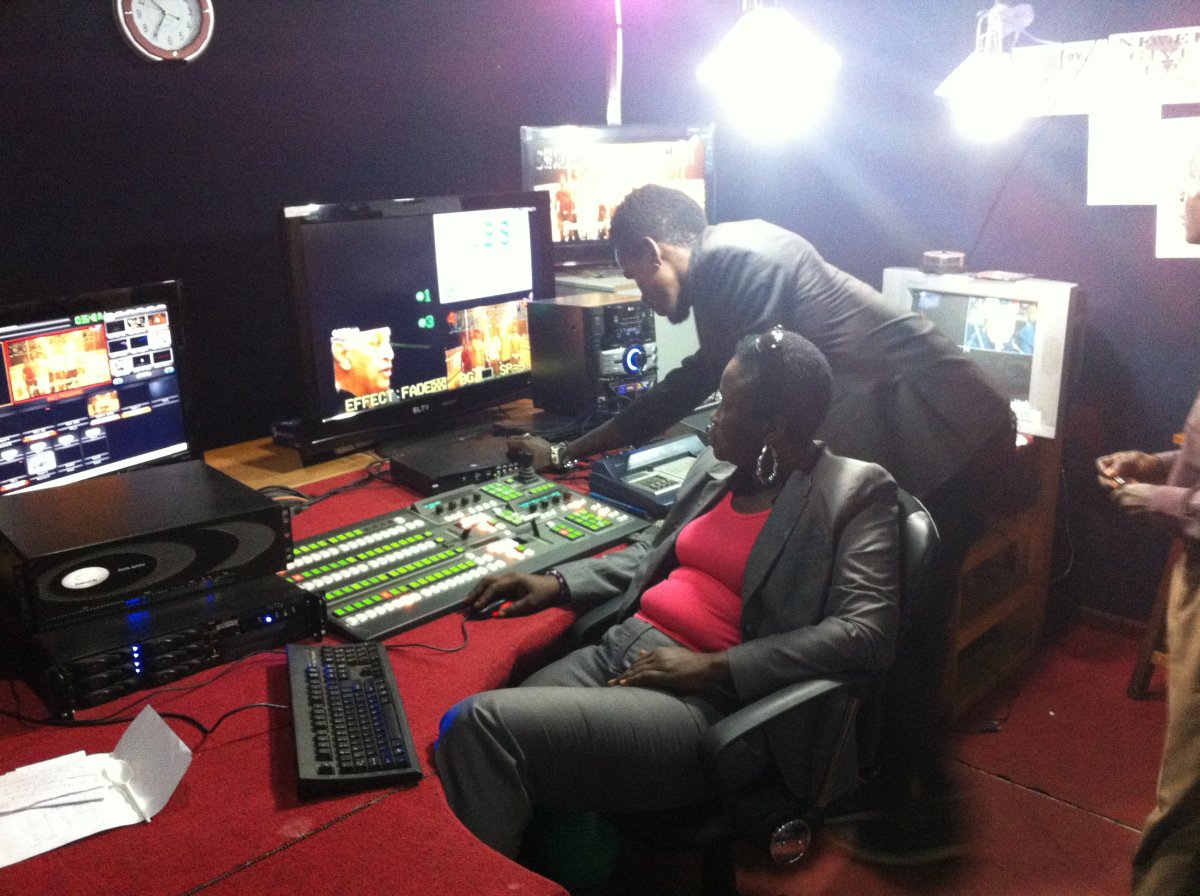After 23 years off the air, Liberian state TV is finally getting rolling on a daily news program.

In a country where most citizens don’t have access to power or running water – let alone a television set – LNTV is an ambitious endeavour. But more so because its staff of about 20 has virtually no television news training at all. They were plucked from the radio news division.
That’s where I come in.
When Real TV in Monrovia caught fire on the first day of my placement with Journalists for Human Rights (JHR), I was left with no journalists to train.
Then I was introduced to the ambitious and hard-working Nathan Charles. With little TV training himself, he has been tasked with managing the brand new 30-minute show and two news updates a day. He told me his staff desperately need my help.
I had heard about Nathan before I came through my Global News colleagues Barry Acton and Laurel Clark, who were here last spring. He was their “fixer” – the guy who took them around town helping them get from place to place, get interviews with the right people, translate where necessary and make sure they stayed out of harm’s way.
When I went into the newsroom the next day, I was pleasantly surprised at the resources they had. Several cameras, many laptops and desktop computers (nice, shiny Macs too), a studio and a decent control room. But when I went around the room hearing from the different reporters, camera people and editors, I heard a laundry list of things they needed help with.
Shooting. Writing. Standups. Editing. Story ideas.
They had all the gear. But they had little to no knowledge of how to use it to make TV news.
Gulp. I only have about 8 days with these guys.
They have had other help – a French crew was here a few months ago and some of the LNTV crew were sent to CCTV in Beijing to learn the ropes.
But this kind of project will take a lot more than that.
I jumped right in, going along with two reporters on a shoot to Red Light – a commercial market district of Monrovia. It’s an eyesore. Garbage is piled on the side of the road, mixed in with human excrement and other nasty stuff. The stench made me gag.
Our first stop was a section that had been devastated by a fire that morning. I followed the reporter and cameraman as they hopped over smouldering debris, marvelling at how fire crews let people just sift through hot spots without any protection. I had to watch my step as the rubble shifted under my feet. We found some people affected and got some shots. Then I coached the reporter through an on-camera, showing the scene.
From there we drove a few blocks to one of the giant garbage piles. I once again gagged as we stood next to one so he could shoot an on-camera and talk to some affected people. Food stations were not far away from the disgusting mess.
While a huge shock to me, the reporters didn’t seem fazed by what they saw. We jumped back in the car and back to the station, eager to put the stories together.
But that didn’t happen. Despite all the seemingly fancy equipment they had, the tape wouldn’t play. It was either too dirty or too overused. There goes all that work.
I won’t lie. That type of thing has happened to me in my many years in the field. Technology does have its limitations.
My last few hours on that first day were spent feverishly vetting (err… writing) scripts. Every time I finished one, another reporter pounced, asking for help. I must have gone through five or so. I eventually had to pry myself away, to let them finish what they started on their own.
JHR’s philosophy is help local media develop skills to cover human rights stories without creating a dependency. I can quickly see how the wrong approach to training can do just that.
I feel for Nathan. He has such a difficult road ahead, filled with the pressures of management demands and expectations from colleagues and ordinary Liberians. Not to mention the complicating factor of working for the state broadcaster. I noticed a sign on the wall saying all shows must be vetted by a higher-up prior to air.
But Nathan also has a tremendous opportunity to shape the media landscape in this country. TV news is still in its infancy. And it’s a powerful tool for improving the lives of the people here.
On my first out of town trip last week I was struck by the comment of one local journalist I met. He was talking about how difficult it is to live and work here, and how the war left such devastating effects on people – psychological, economic, physical.
I asked him why he stayed in Liberia when he had the chance to leave.
“Because if I leave, who will fix it?”
I think Nathan is one of those “fixers.” And I’m excited to watch him and his dedicated crew grow, even from afar.




Comments